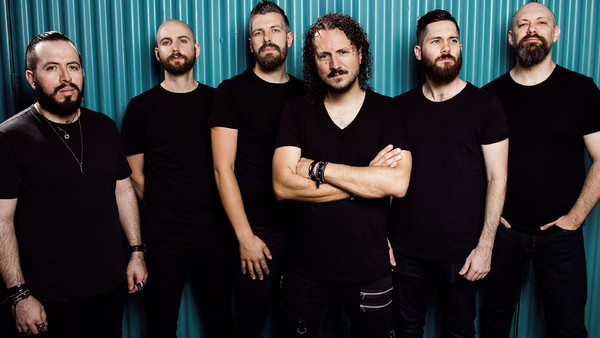Haken Interview: Vector, “The Good Doctor” & Rock Operas
The prog heroes are trimming the fat and upping the metal on their impending fifth album.

On 26th October, Britain’s underground heroes Haken will release Vector: a progressive rock opera that fans have been desperately clambering for ever since the six-piece ascended to new, lauded heights with 2016’s dynamic Affinity.
And while the group’s prior album delighted en masse as a stacked hour of technicality and dynamics (somehow uniting modern, ultra-complex heaviness with dashes of vintage rock, symphonic undercurrents and electronic interludes), its follow-up is definitely a much more streamlined and powerful affair.
With a running time of only 45 minutes, Vector witnesses Haken cut the fat in a blink-and-you’ll-miss-it dance of in-your-face polyrhythms and boisterous hooks. Avant-garde anthems like “The Good Doctor”, “Puzzle Box” and “A Cell Divides” crossbreed their well-established prog stylings with rock ‘n’ roll’s more primal pleasures, such as energising melodies, soaring clean vocals and visceral riffs. And while they still find room to go balls to the wall on the industrial-tinged instrumental “Nil by Mouth” and the lengthy, relentless “Veil”, it is easily apparent that Vector is a different, more metallic beast when compared to Haken’s usual bread and butter.
To talk all about the redefined musical ideology presented on this new release, I got the chance to pick the brain of guitarist and co-founder, Richard Henshall.
Matt Mills: “Vector is a much more streamlined and wholly metal album than anything else Haken has done. How much of that came from the band itself and how much of that came from working with your producer, [ex-Periphery bassist] Nolly?”
Richard Henshall: “We started getting ideas down and it just felt like they were more rough, more gritty-sounding than our previous albums. Naturally, these evolved into heavier pieces. During the early stages, we were thinking of guys we could approach to mix it and Nolly’s name just kept coming up. He was just so cool to work with: really chilled out, down-to-earth and receptive to our ideas. It was quite a symbiotic relationship between us.”
“With the heavier material, did you feel like you were venturing out of your comfort zone on this record?”
“No, we still, pretty much, largely produced it ourselves and the clean, crunchy tone of the guitar we came up with ourselves. In terms of streamlining stuff, we just wanted to get rid of all the excess fat. We just chiselled away at these ideas and focused on what we felt were the quality parts of these songs, until we were left with these more concise, digestible pieces. It definitely is our shortest album, so people might be put off by that, but I really don’t think we have compromised the quality.”
“Is this the most accessible Haken album?”
“Yeah, I reckon so. It wasn’t a conscious thing: if anything it is actually our most technical and complex music to date, really. So, in one sense, it’s more accessible in terms of length, but the actual content may be harder to digest.”

“And obviously, before this album, you did the Shattered Fortress tour with Mike Portnoy, where you were playing Dream Theater songs night in and night out. Did that tour impact Vector in any way?”
“Yeah, totally. We were playing those songs for a year, all around the world, every night. Even before the tour, we probably spent a year learning the songs, as well. So there was a good eighteen months to two years of just playing this music, which is amazing because this is music I grew up loving. It had a massive impact on me as I was growing up, so to play it was really cool! When you’re writing music, if it’s gonna be as honest and natural as you want it to be, it has to be a reflection of what you’re into. Maybe subconsciously it poured out into our own music; we just put them into the Haken format in the most natural way possible.”
“From a lyrical standpoint, the band have said that Vector is a rock opera, so are you able to tell us about the story of the album?”
“It’s probably our most dramatic, larger-than-life concept album. We released a song called ‘The Good Doctor’: that’s the first full song on the album. That song sets the scene for the album: there’s a manic, disturbed doctor who’s giving electroshock therapy to a patient. During the process, he unearths a lot of dark, disturbing thoughts and memories from his past, and it’s all about him trying to overcome these issues. The album is seen through the patient’s eyes, but there is also a more general theme of psychotherapy and psychology that’s running through the whole album. There are a lot of references to these experiments that took places in the fifties and sixties.”
“It may be too early to tell, but do you think the more direct musical and lyrical styles introduced on Vector will continue through future Haken albums?”
“I guess, if you look at our catalogue, each album has its own thing going on. Across the band, we listen to a wide array of music and there are a lot of influences for us to dip into. You never know, we might write a chilled jazz album next. Who knows? It’s really a matter of what you’re into at that time and this just felt right at this moment, to get some of those early metal influences in. I grew up loving bands like Soulfly, Machine Head, Fear Factory and Meshuggah. Those were massive influences on me in my teenage years, so it’s cool to be in a band where we can channel some of that.”
Vector is out on 26th October via InsideOut Music.
Haken tour North America, Latin America and Europe from October to March.